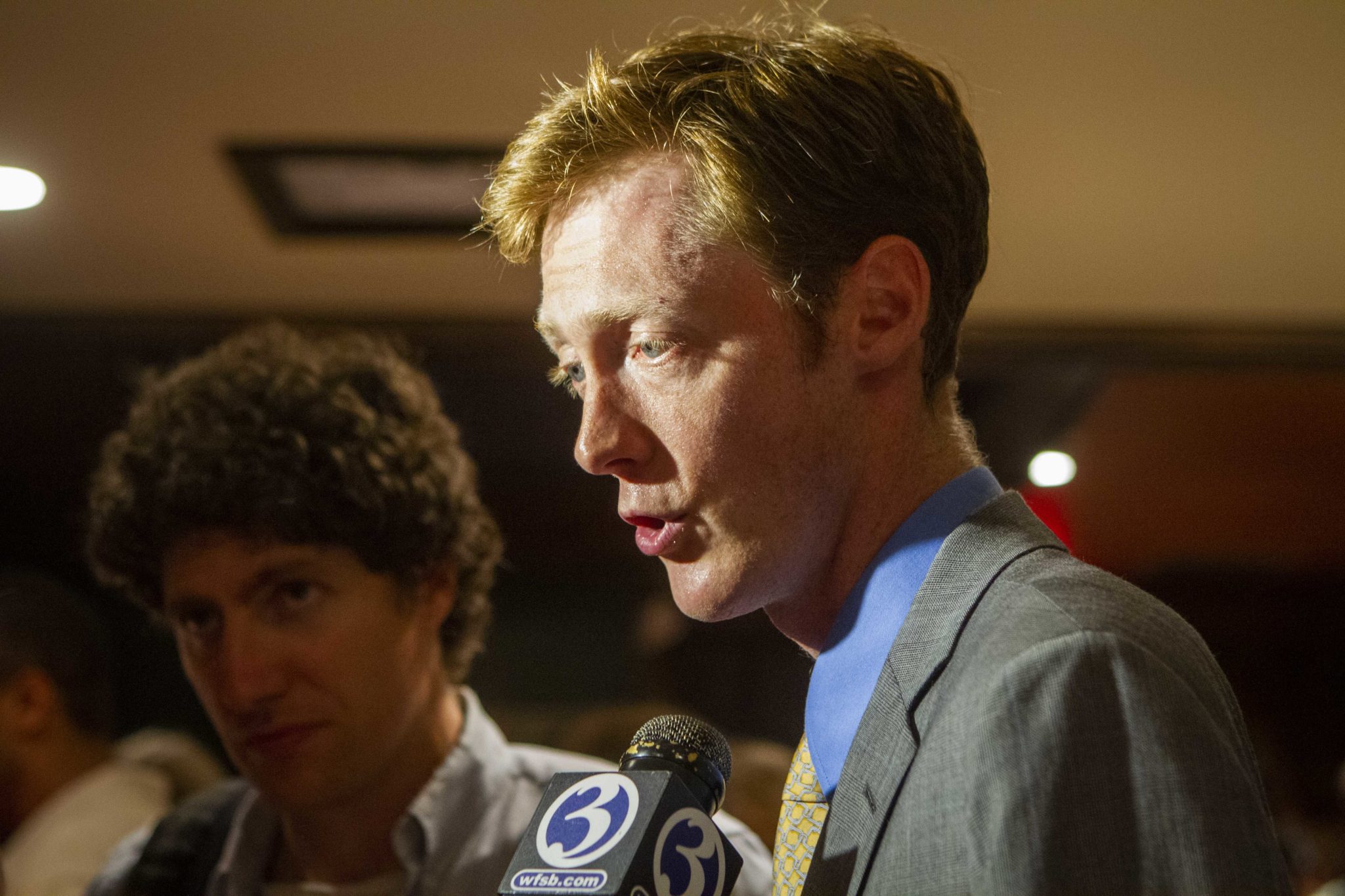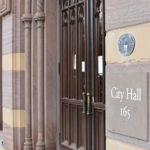As probable second Elicker term looms, religious leaders ask for commitments on public health issues
Mayor boasts progress on key issues but declines to say yes or no to ‘pretty specific’ questions.

Yale Daily News
At a mayoral candidate assembly in Hamden last Wednesday, religious leaders across Connecticut voiced their demands to Mayor Justin Elicker regarding issues such as gun violence, street safety and health in schools.
Elicker has all but secured a second mayoral term in City Hall after his only serious Democratic competitor, former Housing Authority President Karen DuBois-Walton, abruptly left the race. Now, New Haveners are already seeking commitments from Elicker for his next two years in office. At Wednesday evening’s forum, hosted by Congregations Organized for a New Connecticut, or CONECT, Connecticut residents asked Elicker specific questions about his plans for the next term.
CONECT’s questions focused on three central demands: the diversion of funds to public school health services, attention to street safety in Fair Haven and public updates on the city’s gun violence response. In response, the mayor generally avoided locking in answers but said that public health and safety would remain central to his next term in office.
Specifically, leaders asked for policy commitments on redirecting funds to help treat public school students with asthma, completing infrastructure projects in Fair Haven and holding public meetings about the newly-proposed Department of Community Resilience, which Elicker declined to provide. He later emphasized that while he would not promise specific measures, he shares many of CONECT’s goals.
“I think we got off on the wrong foot with me answering ‘No’ to a couple of what I think were pretty specific questions,” Elicker said in his closing remarks about the questions related to CONECT’s three central demands. “I think the spirit of what we all are trying to accomplish here is aligned.”
Over 200 CONECT leaders attended the event, which was held both in person and over Zoom. Attendees also asked for commitments from mayoral candidates in Hamden, who are currently fighting a race far more contested than New Haven’s.
In their opening remarks, Rev. Philippe Andal of New Haven’s Community Baptist Church and Rabbi Brian Immerman of Hamden’s Congregation Mishkan Israel gave examples of what they think public health and safety means in New Haven and Hamden.
“When we say public health, we mean that our elected officials must address asthma, which disproportionately affects Black and brown communities,” Andal said. “When we say public health, we mean that our elected officials must protect and preserve open spaces in all communities so that people can breathe fresh, safe air and stretch their legs.”
Immerman said public safety means ensuring that visible signs and crosswalks are omnipresent across Connecticut. He also said it meant addressing gun violence while remembering that “police brutality is not public safety.” Immerman told attendees that, already this year, 23 people have died through gun violence in southern Hamden and New Haven in 2021.
Gun violence was at the heart of one of CONECT’s commitment requests. The others focused on street safety and asthma among school-aged children. For each issue, the mayor was asked a question about whether he could commit to a policy related to the issue point-blank, and he would be forced to either say “yes” or “no.”
Support for students with asthma
Tynicha Drummonds asked Elicker if he would commit to allocating $2 million of American Rescue Plan funding to community health workers supporting New Haven public school students struggling with asthma. Drummonds is a New Haven resident whose foster daughter and great niece suffer from asthma.
“[My foster daughter] loves to play and run, but sometimes she has to stop so she doesn’t have an asthma attack,” Drummonds said.
Veronica Douglas-Givan also spoke on the issue, noting that one of her brothers also had asthma and that she had to watch him “gasp for air while he was playing.” She also brought her asthmatic son up to the podium, saying that her child often felt suffocated inside his class room at Worthington Hooker School.
Although CONECT members wanted Elicker to commit on the spot to diverting substantial funds to the issue, the mayor admitted that he could not provide an answer at that time.
“We have school nurses, and we will continue to ensure that we have school nurses in every school,” Elicker said.
Infrastructure repairs in Fair Haven
CONECT also asked Elicker to commit to completing several infrastructure projects around the Fair Haven area. They highlighted a survey that identified 85 useful repairs and improvements around the neighborhood. The list includes 35 intersections that do not have crosswalks and stop lines.
CONECT said they had sent the list to Elicker a week prior to the event, and they asked the mayor to commit to achieving 63 or more of them over the next two years.
But Elicker said he had not seen CONECT’s list.
“I will continue working with you, but I cannot commit to putting city infrastructure investments into a list I haven’t seen,” he told CONECT leaders.
Later in the evening, Elicker said he looked at the list during the meeting. In response, Elicker said it would be difficult for him to focus solely on Fair Haven’s infrastructure needs — he must treat all of the city’s neighborhoods equally, while prioritizing communities of high need.
CONECT interpreted that answer as a “no” on the infrastructure question.
Addressing gun violence
“Mayor Elicker, will you commit to facilitating public monthly sessions to provide updates on the status of the Department of Community Resilience and Community Crisis Response team and seek community input?” Qadry Harris of the Community Baptist Church asked the mayor.
The Department of Community Resilience is a brand-new concept proposed by the Mayor’s office at the beginning of August. If it is approved by the Board of Alders, the department will receive $6 million a year.
The department would serve as an umbrella organization which would also oversee the Community Crisis Response Team, a city initiative that works to ensure various professionals — not just police officers — respond to 911 calls.
“For these programs to be successful, we need data,” Harris said. “There must be an evaluation plan to achieve the sustained funding and the long term success… The people closest to the problem are closest to the solution. They must be consulted.”
John Levi Lewis, a pastor in New Haven, said his New Haven church is the one he grew up in. The church is supposed to be a place of comfort for its members, he said, but now members did not always feel protected within its walls.
“It used to be a safe place where the congregates could come,” he said. “Now, it’s not always a safe place to worship. There have been shootings in front of the church and behind the church… the safe environment has been threatened by gun violence.”
However, Elicker once again said he could not commit to the specific guidelines of the monthly sessions. He said it was not that he could not commit to community engagement but that the new Department of Community Resilience is broad and each agency under it has its own form of community engagement.
“I will commit to a public process and continued engagement,” he said. “There has been a community hearing that the public was welcome to participate in; we had a lot of good feedback.”
Elicker will face a Republican challenger for New Haven mayor in a November election.








